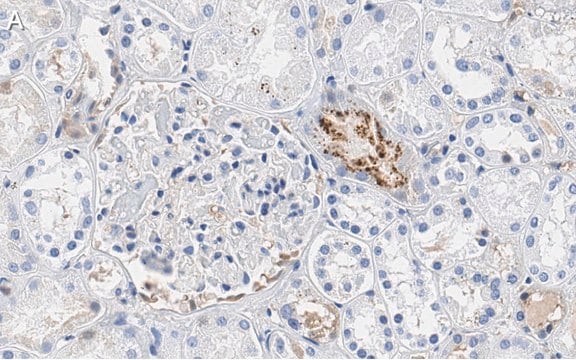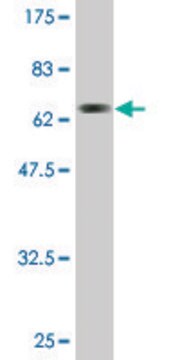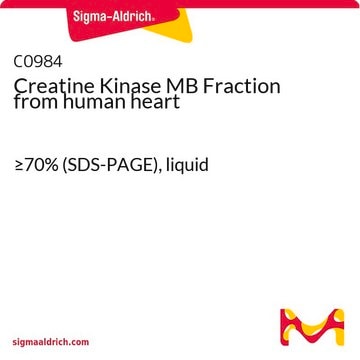ABS1063
Anti-phospho-LRP-6 (Thr1479)
from rabbit
Synonyme(s) :
Low-density lipoprotein receptor-related protein 6
About This Item
Produits recommandés
Source biologique
rabbit
Forme d'anticorps
affinity isolated antibody
Type de produit anticorps
primary antibodies
Clone
polyclonal
Espèces réactives
human, mouse
Réactivité de l'espèce (prédite par homologie)
rhesus monkey (based on 100% sequence homology)
Conditionnement
antibody small pack of 25 μg
Technique(s)
inhibition assay: suitable (peptide)
western blot: suitable
Isotype
IgG
Numéro d'accès NCBI
Numéro d'accès UniProt
Modification post-traductionnelle de la cible
phosphorylation (pThr1479)
Informations sur le gène
human ... LRP6(4040)
Description générale
Spécificité
Immunogène
Application
Signaling
Peptide Inhibition Analysis: A 1:500 dilution from a representative lot was used with membrane fraction extract of 293T cells co-transfected with N-terminal flag tagged hLRP6 and Xenopus l. Casein Kinase 1g1 for peptide block analysis.
Qualité
Western Blotting Analysis: 1 µg/mL of this antibody detected phospho-LRP-6 (Thr1479) in membrane fraction extract obtained from Wnt3a medium treated mouse embryonic fibroblasts.
Description de la cible
Forme physique
Stockage et stabilité
Autres remarques
Clause de non-responsabilité
Vous ne trouvez pas le bon produit ?
Essayez notre Outil de sélection de produits.
Certificats d'analyse (COA)
Recherchez un Certificats d'analyse (COA) en saisissant le numéro de lot du produit. Les numéros de lot figurent sur l'étiquette du produit après les mots "Lot" ou "Batch".
Déjà en possession de ce produit ?
Retrouvez la documentation relative aux produits que vous avez récemment achetés dans la Bibliothèque de documents.
Notre équipe de scientifiques dispose d'une expérience dans tous les secteurs de la recherche, notamment en sciences de la vie, science des matériaux, synthèse chimique, chromatographie, analyse et dans de nombreux autres domaines..
Contacter notre Service technique








